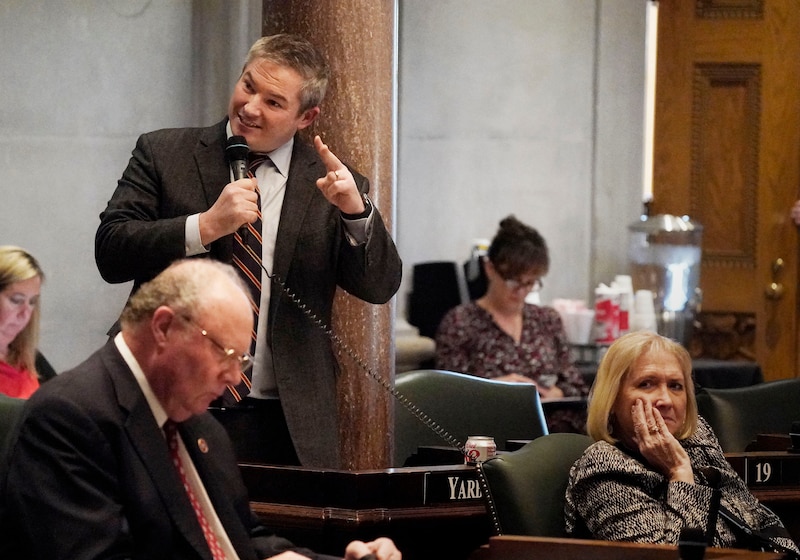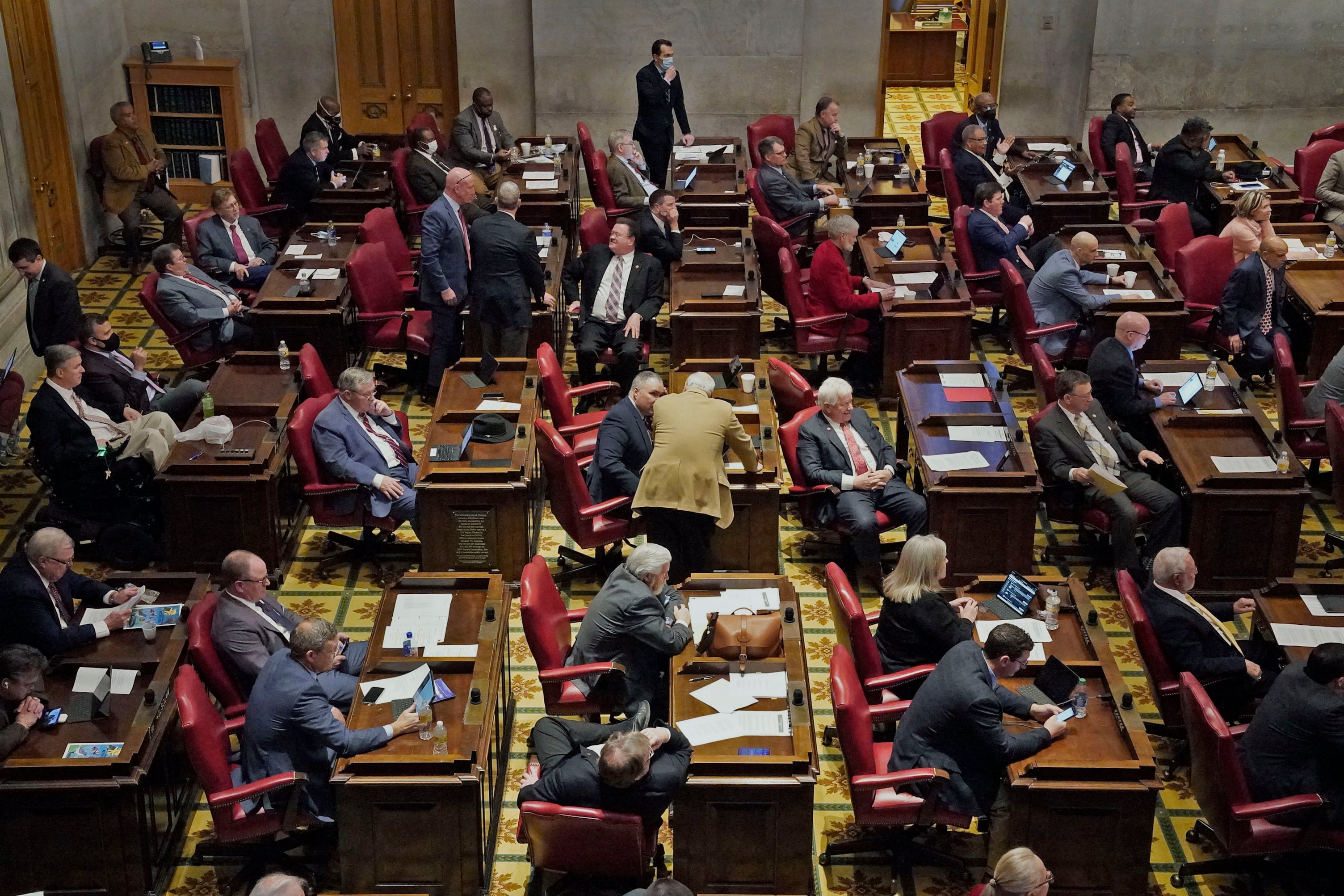Gov. Bill Lee’s plan to change how Tennessee funds public education passed Thursday out of the legislature, setting the stage to replace the state’s 30-year-old funding formula next year with one that provides more money for students with higher needs.
The sweeping bill, which Lee’s administration unveiled nine weeks ago after a months-long review of the current funding system, easily cleared the GOP-controlled House and Senate Wednesday along mostly partisan lines. On Thursday, the House concurred with a slightly different Senate version.
When signed into law, the new plan will dramatically affect nearly 1 million students, their teachers, and schools, with significant implications for local finances. Beginning with the 2023-24 fiscal year, it will set a base funding rate of $6,860 per pupil, then distribute additional funding for students who are considered economically disadvantaged, have unique learning needs, or live in communities that are rural or have concentrated poverty.
Currently, 38 other states and the District of Columbia have some type of student-based funding model.
The rewrite, called the Tennessee Investment in Student Achievement, or TISA, will replace the state’s Basic Education Program, created in 1992. The current funding system is a resource-based formula that distributes money to school systems based on student enrollment and assumptions about resources needed for staffing, textbooks, technology, transportation, and dozens of other education costs.
The Republican governor, who is running for reelection this fall, announced in late January that he wanted to pour $1 billion more into public schools annually. But he said Tennessee must first update its funding system to focus more on the needs of individual students than on school systems.
Democrats in opposition argued that the promise of $1 billion more in a new formula wasn’t enough to remedy Tennessee’s national ranking as 44th in funding adequacy, according to the Education Law Center, which also graded the state low for its public education investment as a share of its economy.
“At the end of the day, the most important part of a funding formula is the funding, and right now in Tennessee, we don’t do that well,” said Senate Minority Leader Jeff Yarbro, a Nashville Democrat.
Last week, Yarbro proposed adding $1 billion this year to the current formula, but the Senate voted that down.
Instead, buoyed by another year of state revenue surpluses, the legislature passed a state budget that takes effect this July 1 with a $125 million increase toward teacher salaries — equivalent to a 3% raise — and a one-time $500 million investment in career and technical education in middle and high schools.
Opponents concerned about funding levels, ‘labels’ on students
Democrats sought unsuccessfully Wednesday to amend the TISA bill to ensure that Tennessee follows through on Lee’s pledge and injects $1 billion next year into the new formula. They also failed to pass changes that would automatically address inflation in future years, increase transparency about what’s included in the per-pupil funding base, and remove additional investments in charter schools, among other things.
Many Democrats and a few Republicans said they supported establishing funding weights that reflect student needs, but wanted more time to vet legislation of such magnitude.
“We usually take two years to do this,” said Yarbro about significant funding changes, “and we’ve done this in two months.”

Sen. Joey Hensley, one of a few Republicans who voted against the bill, agreed. “I’m afraid that this formula is going to incentivize schools to put more labels on more students … so they can get more money,” said the Hohenwald lawmaker, referring to the funding weights for certain groups of students.
But Republican leaders hailed the formula as comprehensive and cited the input of thousands of Tennesseans based on public comments, 16 town halls, and dozens of meetings with education stakeholders.
“We have ripped this bill up and down,” said House Education Committee Chairman Mark White, a Republican from Memphis, about amendments to the bill.
“Change is hard. Even positive change is hard,” said Sen. Bo Watson, a Hixson Republican who chairs his chamber’s finance committee. “But this is transformational, and it’s time to transform education in Tennessee.”
Adding more accountability layers and competitive-pay grants
Education Commissioner Penny Schwinn, who spearheaded the state’s funding review, said TISA’s base covers all the costs of the current formula and more, including enough money to get Tennessee schools to the nationally recommended ratios of school nurses and counselors, a dire staffing need highlighted by the pandemic.
Beyond the base and weights, the plan allocates funding of $500 per K-3 student to improve reading, as well as money to pay for literacy tutoring for struggling fourth-grade readers and to support career and technical education for older students. It also sets aside funding to help charter schools pay for their facilities and to help fast-growing districts with infrastructure needs.
The law creates several new panels charged with holding school systems accountable for how they spend state funds to improve academic performance, even as schools and districts are set to receive their first letter grades this fall as part of accountability measures under a 2015 federal education law.
One new committee can order a corrective action plan or appoint an inspector general to oversee school programming or spending for districts or charters schools that get a D or F on the state report card. Another “progress review board” can recommend that district leaders complete training if they fail to make incremental improvements toward the state’s overall goal of getting 70% of third-graders proficient in reading, based on state test results. Currently, only a quarter of Tennessee students meet that threshold, down from a third before pandemic disruptions to schooling.
Watson, the Senate’s finance leader, called the literacy goal “one of the most critical pieces of this piece of legislation.”
Another late change adds state grants to help school districts offer competitive salaries to educators working in counties with a higher cost of living than the state average. Those currently include Anderson, Davidson, Shelby, and Williamson counties.
Big questions loom about impact on local finances, intent
Lee’s funding plan faced an uphill political battle at the outset of the legislative session in January, with GOP leaders calling it a heavy lift during an election year when lawmakers are anxious to recess early to begin their campaigns.
Professional organizations representing school superintendents, school boards, and teachers never signed off on the plan. But as the legislation changed, momentum grew, including an endorsement last week by a statewide alliance of more than 40 civil rights, social justice, and education advocacy groups. While the groups still had questions, they ultimately concluded that TISA would be an improvement over the current formula.
Significant concerns remain. Local governments are constitutionally required in Tennessee to contribute funding for schools, and the average split is 70% from the state and 30% from locals.
An analysis by The Tennessean showed that, while nearly every school district will receive more funding under TISA, nearly two-thirds will receive a lower percentage of the state funding pie than under the previous formula because of how local contributions will be calculated.
Lee’s administration has assured local officials that they’ll have three years at the same local funding level to adjust to the new formula, but many are concerned they’ll have to significantly raise local sales or property taxes in the 2027 fiscal year.
Student-centered funding, also known as “backpack funding” because the dollars follow the student, has been called a gateway to private school vouchers by public school advocacy groups wary of the model drafted in 2010 by the conservative American Legislative Exchange Council.
“Student-based funding formula is not necessarily a bad concept inherently,” said Sen. Heidi Campbell, a Nashville Democrat who voted against the bill. But “I have really grave concerns about how this formula is going to accelerate defunding the public school districts.”
She cited the growth in Tennessee of charter schools, virtual schools, and private school vouchers for students with special needs.
Lee, who has tried to expand both charter schools and private school vouchers, has denied that privatization is a goal behind his funding plan. The state’s 2019 school voucher law, which Lee pushed for but was overturned by a judge in 2020 for applying only to students in Memphis and Nashville, is awaiting a ruling on the state’s appeal to the Tennessee Supreme Court.
Reaction is mixed to TISA’s passage
Education groups supporting TISA cheered the bill’s passage as a way to help school communities meet the unique learning needs of students.
“The additional state funding from TISA will help students in so many ways as districts invest the money to address achievement gaps, provide intensive early literacy support, and better support students living in rural communities or concentrated poverty,” said David Mansouri, president and CEO of the State Collaborative on Reforming Education.
But JC Bowman, executive director of Professional Educators of Tennessee, worried about the eventual impact to local taxpayers and whether state dollars earmarked for teacher salaries will reach the pockets of teachers.
“We believe we could have addressed both of these problems,” Bowman said, “if we were given more time to discuss and debate those critical issues.”
Marta W. Aldrich is a senior correspondent and covers the statehouse for Chalkbeat Tennessee. Contact her at maldrich@chalkbeat.org.






